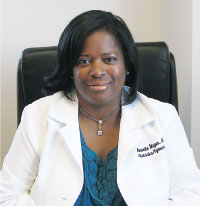Dr. Annette Mayes – To your health
May 2, 2010 by Las Vegas Black Image Magazine
Filed under Community, Health
During her 16 years in practice as an obstetrician/gynecologist, Dr. Annette Mayes has become one of the leading women’s health advocates in Las Vegas. On the occasion of Mother’s Day, Black Image asked her a series of questions about women and wellness.
What do African-American women need to think about as it pertains to their health?
The biggest thing is to take all of the preventive measures that you can. A lot of us wait until we become very sick before seeing a doctor. We don’t react unless we feel pain and … some of us, if we are not experiencing pain, we put off going to the doctor. I can’t tell you how many people have come in to see me, and say that they had a pap smear five years ago, and it came back abnormal, [but] they got scared and never returned for a full examination by their doctor.
Does the food we eat play a part in preventative health?
Yes, it does. The right eating habits can prevent diabetes, high blood pressure and high cholesterol.
How should we deal with stress?
Stress affects all of us trying to make ends meet. The bad economy, among other things, can cause us to forget about taking care of ourselves. We have to be strong and focused, and take time to exercise, spend time with friends or just enjoy some quiet alone time for ourselves.
Is there a correlation between mental and physical health?
Of course. Any time your mental health — or the way you eat or sleep — is affected, it can manifest itself in a physical health condition.
What is the number-one thing that you are seeing in African-American patients?
Off the top of my head, I can’t identify anything. But I am shocked by how many African-American ladies in their early … 60s and older are HIV positive. It took me by surprise, because I never thought I would see this disease in African-American women past my own age group.
Are you seeing a lot of pregnant African-American teenagers?
Oh yes. I have a big population of pregnant teens. Some of them take it in stride, and act as though it is no big deal. The mothers who bring them in seem to have more of a problem with their daughters becoming pregnant. I think the system has mainstreamed pregnant teens in such a way, that they integrate them back into their school environment and it desensitizes the reality of the situation. When I was a young teen, we couldn’t go back to our schools if we got pregnant. We had to go to a special school. Some of today’s teens don’t have a concern about having a baby or graduating from high school.
How about obesity in our children?
This really concerns me. My children, who are 15 and 13, have to be monitored to stay in organized activities. Or they will — especially my son — sit at home and play video games all day. We have to commit to healthier eating and teaching our children.
What do you tell new mothers whose babies have to receive a lot of shots?
My children were vaccinated — and for the vaccines that are tried-and-true and have been around for a long time, I say get them. We have to keep in mind that no vaccine is 100 percent safe. But I think it is important to have your child get their shots. Do your research and ask your child’s pediatrician if you have concerns.
Do you see more African-American patients with breast cancer?
I think that for African-American women, the biggest problem is that we are getting diagnosed later. There are a lot of women who feel a lump in their breast and ignore it. They don’t come in to see a doctor because they are afraid. Older womenespecially, choose to ignore problems in their breasts. Many times, older women come in to see me because their daughter brings them in for a mammogram.
Are you saying that African-American women come into your office to get their mammograms less frequently than other women of other races?
No, there are a lot of conscientious African-American women who do get their pap smears and mammograms. But I do think that African-American women are more prone to putting off their medical exams.







Through comments on blogs or weblogs, teachers can share their classroom experiences. Her articles held a reader’s interest.”